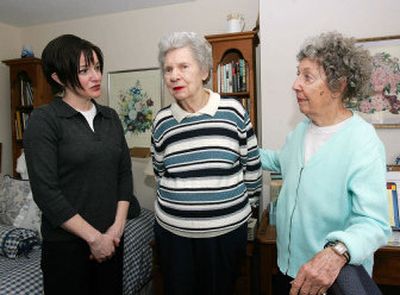Prescription plan choice gets the spin treatment

ATLANTA – This month the federal government placed a Valentine-themed ad in People magazine that shows a smiling young woman being hugged by a grateful-looking elderly woman.
An attached card for readers to send to their parents listed “5 ways to say I love you.” Among them: “I love you,” “I love you like kids love cookies,” and “Let’s talk about Medicare prescription drug coverage.”
The idea: The elderly will turn to their children for help in evaluating the program’s complicated coverage options, and thus open a conversation about health and medication needs.
“I’ve heard a lot of people say, ‘I had no clue my parents took these meds,’ ” said Kathleen Harrington, who leads prescription program outreach for the federal Centers for Medicare & Medicaid Services.
She and other federal officials point to the mind-numbing array of drug coverage options as an opportunity for family bonding. However, plenty of other people question how often the program is triggering the kind of Hallmark moments Medicare officials are talking about.
Family relationships are complicated, and many parents don’t feel comfortable sharing personal medical information with their children. The new Medicare benefit does not seem to be changing that, said Dr. Jeff Lesesne, medical director for two Emory Healthcare nursing facilities in Atlanta.
Indeed, most of the dozen seniors interviewed in Atlanta recently said they didn’t turn to their kids for help. Some felt they didn’t need help. Some said it made more sense to ask a pharmacist or social worker. Some said they weren’t close to their children. And some didn’t want to be a burden.
Luanna Miller, 84, said she “didn’t want to bother” her daughter, whose husband just had surgery.
The program’s complexity and well-documented problems have undoubtedly caused some anxious seniors to turn to their children, and led children to better understand their parents’ health status, said Andrew Scharlach, a University of California-Berkeley professor of social welfare and a member of the California Commission on Aging.
But Scharlach, a critic of the benefit, said that doesn’t mean the new program should be celebrated as some kind of transforming agent improving familial bonding.
“If an asteroid was going to fall in the middle of downtown Atlanta tomorrow, one side effect is people would get to know their neighbors and have a lot of improved relationships. But I don’t know that that’s a positive thing, overall,” Scharlach said.
For seniors still considering the program, many have found the options overwhelming. Most states have dozens of Medicare drug plans, each with its own list of covered drugs, prior authorization rules, premiums, co-pays and deductibles.
Experts say the easiest way for seniors to compare options and sign up for a plan is through an Internet service offered by Medicare, at http://www.medicare.gov. But surveys show that only about a fifth of people 65 and older have access to the Internet.
Medicare officials knew that, and expected many seniors would turn to their adult children for computer help. “We’re trying to get the adult children engaged,” Harrington said, adding that the $325,000 People ad was part of that effort.
Medicare also has done outreach with financial planners, who are advising families on retirement planning and may see Part D as an opening to doing other business with beneficiaries’ children, Harrington said.
U.S. Secretary of Health and Human Services Mike Leavitt has talked about helping his own parents enroll. Both in their 70s, they brought their prescription drugs with them.
“As I picked up each bottle, we had a conversation about what the purpose of that one was,” Leavitt said. “I learned things I didn’t know before. It was an important conversation.”
In other families, kids are not involved, and elderly parents want to keep it that way. “The fear is, ‘If I say to my doctor – in front of my child – that I’m having trouble bathing or driving or dressing, they (children) may try to make me move or take away my independence,’ ” Lesesne said.
Lucinda Smith, 60, in December chose a plan for her 75-year-old husband, Eddie, whose drugs were previously covered by Medicaid.
They haven’t consulted the retired construction worker’s children. “I don’t know his kids,” Smith said.
Even in cases where beneficiaries did work with their children, family members were nonplussed by the experience.
“I don’t think anything I learned was like, ‘Oh, wow, it brought me closer to them,’ ” said Parthiv Parekh, 39, editor of a monthly magazine that serves the Atlanta area’s Indian and South Asian communities.
“I just learned a couple more prescriptions that they take,” he said. “If anything, it was just one more headache.”